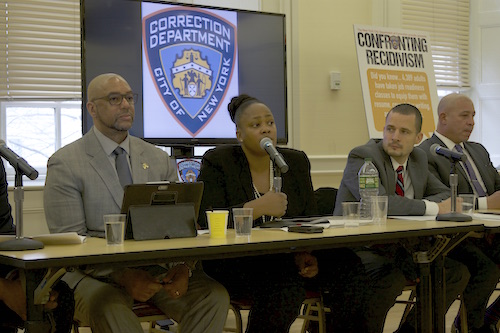More than 100 people gathered at Brooklyn Borough Hall, 209 Joralemon Street in Downtown Brooklyn yesterday with a common goal: a second chance.
That event was the City’s Department of Correction (DOC) hosting of a panel and job fair aimed to support re-entry for formerly incarcerated individuals.
“I don’t want to go back,” said one attendee who served time at Rikers Island. “I want to be with my family. I want to break bread with them. I want to spend Christmas. I want to spend New Year’s. I want to see my daughter succeed.”
The attendee further explained to the panel that he is unable to visit his 3-year-old autistic child on the weekends due to the conditions of his parole. While he completed a training program offered on Rikers and was able to find employment upon his release, he still faces barriers to move forward like many others with criminal convictions.

With earlier town halls held in the Bronx and Queens, the Brooklyn event is the last of the Confronting Recidivism series. Phil Terwiel of the DOC moderated the panel, which included Winette Saunders Jackson, also from the DOC, Kevin Cummings of the Department of Small Business Services (SBS), Felicia Henry of the Mayor’s Office of Criminal Justice, Stanley Richards of the Fortune Society and Lorenzo Gallo of The Safety Group Ltd.
The panelists underscored the importance of training and employment opportunities to reduce recidivism.
“We do not believe that re-entry planning begins on the day you get sentenced,” said Saunders Jackson, DOC Deputy Commissioner of Youthful Offender and Young Adult Programming. “We believe it begins on day one of incarceration. Every moment of jail time is critical to planning that successful transition.”
Mayor Bill de Blasio‘s administration has provided more than $43 million in new programming funds in the current and last two fiscal years, according to DOC Commissioner Cynthia Brann. In her opening remarks, she said the agency is working to offer five hours of daily programming for every inmate—an increase from the previous average of less than an hour per day.
Henry discussed the $10 million “jails to jobs” initiative announced last March. The program consists of peer navigators, transitional employment, trained workforce providers and educational subsidies.
Karen Broughton of Assemblyman Félix Ortiz’s (D-Sunset Park, Red Hook) office thanked the organizers for the event but told the panelists that town halls need to take place in communities.
“We represent Red Hook, which is one of the largest NYCHA [New York City Housing Authority] developments in New York City,” she said. “There are a lot of people that have records that never leave the confines.”
Following the panel discussion, more than 25 employers and resource groups participated in the job fair.
Although 70 percent of incarcerated individuals return to prison within three years, Richards urged the audience to focus on the 30 percent that do not.
“The success stories are the brothers I’m looking at who I had a chance to talk to this morning who gave me their resume, came to find a job, came to ensure they don’t go back to prison,” he said of the event’s attendees. “They are the success stories.”

















